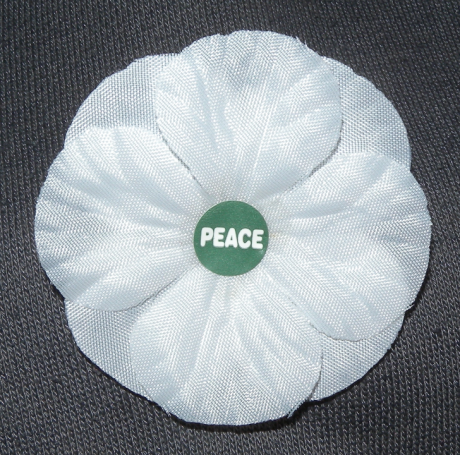Columns
You are here
War and remembrance

November 7, 2012
When I was a little boy, my brothers and I were rummaging through boxes of old, packed-away stuff in our basement, and came across what we thought was a treasure trove: a sealed package containing shiny silver medals and a pin in the shape of wings, a white silk scarf, a leather flying helmet and photos of my dad in his youth.
He looked like a young Clark Gable with his pencil thin mustache, wearing a leather jacket with lamb’s wool collar. The wings pin was on his chest, and the white scarf around his neck. He was standing in front of the propeller of a Spitfire fighter plane.
There was one more thing in the box, a record in a plain white paper sleeve discoloured by the years. It was the size of a regular phonograph record, but was made of metal and only had grooves on one side. We took it to our old portable record player and after some experimenting discovered that you had to place the needle in the centre, at 78 rpm speed, and it played outward to the edge.
It was a recording of a wartime CBC Radio program; the announcer excitedly introduced Gerry Bell, RCAF “ace” who had the distinction of “downing a German plane without firing a shot”. Then came a voice I barely recognized, young and nervous, awkwardly reciting his story.
My father had pursued an enemy fighter over the English Channel. The German flyer, trying to elude the Spitfire, threw his plane into a steep dive and my father followed. The centrifugal force must have caused the German to lose consciousness, and his plane crashed into the water without my father having fired his guns.
For this he was celebrated.
I remember we were stunned by this find. Although I knew both my parents had served in the war (my mother was a Nursing Sister) they seldom spoke of it. But here was proof – my father was a bona fide “hero”, proclaimed by the CBC. We couldn’t wait for him to come home that night to proudly pump him for more of his adventures.
His response was confusing to me then – he seemed almost angry that we had unearthed these mementos, rebuffed our questions and, although I cannot remember specifically, probably proceeded to get drunk.
Even then we were devising strategies to deal, or perhaps avoid dealing with the alcoholism that would eventually destroy my father’s life. We didn’t press the matter and tiptoed around it. The box of wartime souvenirs disappeared, although we found his decorations and wings among my mother’s effects after her death. Their marriage finally ended when I was in my teens, but she always defended him, maintaining that his wartime experiences had scarred him forever.
Although articulating his pain was not his long suit, my father must have agreed with her on some level. One of his least favourite times of year was Remembrance Day. Each year his old comrades would call and urge him to come out to veterans’ events. He always turned them down, until they finally took the hint and stopped calling. He hated Remembrance Day – all he wanted to do, what he was never able to do, was forget.
I vividly remember him saying, “If we really cared about veterans we wouldn’t make the poor old bastards go out and beg.”
Looking back, I think about how what we now know as Post-Traumatic Stress Disorder (PTSD) ruined my father physically and emotionally. I think about how what was only a sad wartime accident was served up by the CBC as propaganda for the home front.
I think about how that death, and the deaths of others he must have caused in “the line of duty”, tore at my father’s soul. And I think about the little boys confused by the experience, and the mingling of love and fear of a man left to fight his wartime demons alone.
We are told that Remembrance Day is about recalling the horror of war, but that is hypocrisy. It is about slyly glorifying wars past and preparing us to accept wars to come.
The government will still trot out the “poor old bastards” on a miserable November day and pretend to honour them. This is the same government that underfunds services they require and still refuses to own up to its responsibilities to those who return shattered by the dehumanization of war.
Not long ago the news told the story of Cpl. Stuart Langridge, who returned from Afghanistan a broken man. After several suicide attempts he hanged himself in his barracks in 2008.
When his mother tried to hold the military to account for its failure to care for her son she was rebuffed; operators at the Department of National Defence were ordered not to accept her phone calls. Defence Minister Peter MacKay and the top general have finally apologized to her, but only after her dogged pursuit of justice was supported by her local NDP MP, and finally picked up by the media in 2010.
The shameful reality is that our government does not take PTSD any more seriously today than it did in 1945. To do so would be to admit that the violence done to soldiers does not just occur in war, but begins on the first day of their training, as they are transformed from human beings into killers.
Today I will not wear the red poppy. I wear the peace symbol instead. I actively oppose the war in Afghanistan. As long as I breathe I will oppose all war. I owe it to Cpl. Langridge, I owe it to my father and I owe it to myself.
Section:
Topics:
- Log in to post comments









